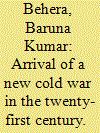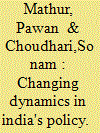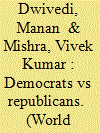| Srl | Item |
| 1 |
ID:
182155


|
|
|
|
|
| Summary/Abstract |
The article provides a retrospective analysis of the successive events that took place in Afghanistan since the exit of the Soviet troops from the country in the nineties and the first takeover by the Taliban. Sanjiv Langer explains why and how that Pashtoon Sunni fundamentalist militia, trained and supported by the Pakistani intelligence and military leadership, survived the US-led invasion and twenty years of occupation by the ISAF, eventually forcing the Americans to negotiate with them and agree to leave by August 30th. The inefficient and corrupt regime installed by the western powers in Kabul was never able to hold sway over the nation and the Afghan National Army lacked the training, discipline and motivation to resist the well planned onslaught of the Taliban. The resulting situation is confusing and does not augur well for the future of the wider region, exposed to consequences of the armed militancy that has overrun Afghanistan once again.
|
|
|
|
|
|
|
|
|
|
|
|
|
|
|
|
| 2 |
ID:
182149


|
|
|
|
|
| Summary/Abstract |
The saying ‘History repeats itself ’ seems to be validated in the present scenario of international politics. The memory of the Cold War era is being resurrected in this twenty-first century. All these things become more visible in this pandemic period with clear-cut fault lines drawn between the USA (the surviving superpower) and China (the emerging superpower). The suspicion about the role of China in spreading the Wuhan Virus (COVID-19) has brought closer the prospect of the new cold war. Recent belligerent attitudes of China support this assessment. Cold war power politics will resurface with Asia as the focal point. The concept of Bi-polarity is taking shape again in world politics. Structures such as the D-10, G-7 extension, Quad grouping and Five Eyes networking bolster the bi-polarity. Against this background, Baruna Kumar Behera seeks to examine international politics in this century.
|
|
|
|
|
|
|
|
|
|
|
|
|
|
|
|
| 3 |
ID:
182156


|
|
|
|
|
| Summary/Abstract |
Relations between India and Afghanistan are characterised by strong historical and cultural links. The two nations share common ideals in the domain of foreign policy such as adherence to multilateralism, respect for a rule-based international order and eliminating the North-South divide. Pawan Mathur and Sonam Choudhari examine how the Indian policy towards Afghanistan even after the takeover of Taliban stresses on norm development and transcendental power as India strives for a peaceful and stable Afghanistan marked by a strong democracy and rule of law. India’s security concerns in Afghanistan after the seizure of the Taliban are also emphasised.
|
|
|
|
|
|
|
|
|
|
|
|
|
|
|
|
| 4 |
ID:
182157


|
|
|
|
|
| Summary/Abstract |
The rushed and chaotic withdrawal of US-led NATO forces from Afghanistan has put an end to the twenty year long occupation and war of the country, leaving very few positive results and a host of unresolved and worsening problems for the wider region. The Taliban have won back the power that the Western invaders had taken from them in 2001. After claiming to fight for their elimination and the eradication of their ‘terrorist’ ideology, the American leadership ended up making a deal with them without involving the government that had been installed in Kabul by Washington and its allies. The Biden administration also essentially ignored the concerns of India in the matter. Sarosh Bana details the colossal expenditures incurred by the United States and its allies and reflects on the absence of tangible benefits for Afghanistan and its population.
|
|
|
|
|
|
|
|
|
|
|
|
|
|
|
|
| 5 |
ID:
182158


|
|
|
|
|
| Summary/Abstract |
The outbreak of COVID-19 has spread rapidly from China to the rest of the world without regard to any geographic border. It has affected people of both the developed and underdeveloped countries alike. In this pandemic situation, it is essential to understand the message carried for the developed countries of the Global North and the underdeveloped countries of the Global South. Md Kamal Uddin surveys its effects and the responses it has attracted, He observes that the COVID-19 crisis has created one more topic of division between the Global North and the Global South.
|
|
|
|
|
|
|
|
|
|
|
|
|
|
|
|
| 6 |
ID:
182153


|
|
|
|
|
| Summary/Abstract |
Manan Dwivedi and Vivek Kumar Mishra review the bipartisan politics of the United States in the last two centuries and describe the broad differences between the respective positions and worldviews of the Democrats and Republicans as they were acted upon by presidents from both parties. While the Republicans may manifest more nationalistic and aggressive leanings in their foreign policies and antipathy to state intervention in society and the economy at home Democrats are equally prone to go to war but usually stand on a platform of ‘social welfare liberalism’ domestically and multilateralism on the global scene. Democrat Administrations as a whole have yielded better economic performances than their GOP rivals but the article reminds us that policies are shaped by the views of presidents and their chosen advisers whose decisions owe much to the specific circumstances they deal with.
|
|
|
|
|
|
|
|
|
|
|
|
|
|
|
|
| 7 |
ID:
182150


|
|
|
|
|
| Summary/Abstract |
The rise of China is one of the most defining features of the twenty-first century world. Pankaj Dodh underlines the fact that the world is on the cusp of fundamental changes. Both the countries put together host the largest populations, the biggest markets, the largest skilled workforce and two of the world’s largest economies and militaries capable of transforming the world unpredictably. They share a strong civilisational, commercial and geographical affinity since ancient periods. China and India should realistically accept their respective geo-political limitations and embrace the principles pledged in the Panchsheel Agreement of 1954.
|
|
|
|
|
|
|
|
|
|
|
|
|
|
|
|
| 8 |
ID:
182151


|
|
|
|
|
| Summary/Abstract |
The evolving nuclear-weapons order in South Asia is striking. The region’s nuclear weapon states – India and Pakistan – have, since the start of the twenty-first century, been following respectively the rival ‘credible minimum deterrence’ and ‘full spectrum’ pathways to secure strategic stability. The diametrically opposite or rival postures, however, widen the spectre of a nuclear-flash and increase the plausibility of a holocaust.
In fact, they call into question the true intention of the parties and cast a shadow of doubt over the pledge to use nuclear weapons as ‘the instrument of last resort’. Attar Rabbani deciphers India’s ‘credible minimum deterrence’; disentangles Pakistan’s ‘full spectrum’ and examines the resultant consequences. It argues that the rival deterrent postures are the result of mutually reinforcing elements present in the respective nuclear paradigms.
|
|
|
|
|
|
|
|
|
|
|
|
|
|
|
|
| 9 |
ID:
182154


|
|
|
|
|
| Summary/Abstract |
India, the land of holistic culture has always given importance to life and its potential. However, one often connects life with freedom. If freedom is to be ascertained as the definition of right, this then leads to absolutism which can create chaos and disorder. Many believe that human rights only have a nominal role in identifying legal rights, but the essence of the theory is that the concept of human rights has surpassed its ability to interpret justice. An attempt to understand various cultures by exploring the aspects of their belief systems which teach and propagate the value of human rights is made here. Sindhu Vijayakumar investigates. Crossing cultural, religious, linguistic and racial differences makes us realise that the suffering of any single individual affects the consciousness of mankind because every human being is connected to the others.
|
|
|
|
|
|
|
|
|
|
|
|
|
|
|
|
| 10 |
ID:
182152


|
|
|
|
|
| Summary/Abstract |
Foreign policy is fundamental for a world leader, especially in a country like India where historically, international relations have not been a high priority. Two of the most influential Indian prime ministers have been Jawaharlal Nehru and Narendra Modi and with leaders of such high stature, comparisons are inevitable. Siddharth Kaushik proposes to find similarities between the ideologies they followed for their foreign policy by looking at their relations with other crucial players as well as multinational organisations. The basis of the principles has been viewed under two aspects, first, the realist or real politic approach and second, the idealist approach. Additionally, a look into the leaders’ personalities in this field and how their backgrounds moulded their policies is also taken into account. The question is whether the preconceived notions of Nehru being an idealist and Modi being a realist are true and how close the two actually are when it comes to their foreign policy.
|
|
|
|
|
|
|
|
|
|
|
|
|
|
|
|